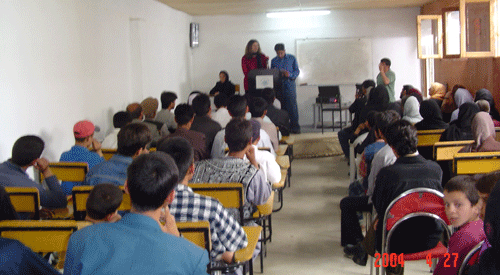When Iran’s presidential election turned into a full blown protest movement, I have to confess that my first regionally centered thoughts turned to Iraq, not Afghanistan. I wondered if the relatively peaceful and successful provincial elections held in Iraq had had an effect on their nearby Iranian neighbors. On the other side of Iran, of course, lies an Afghanistan in the midst of its own crucial presidential election.
The differences between Iran’s and Afghanistan’s presidential elections are just too numerous to go through, but there is one issue that we can delve deeper into, and that is the Afghan youth vote. More specifically, should we expect young Afghan adults to be more engaged after seeing neighboring young Iranians take to the street?
Well, according to International Relations Lecturer at the American University in Kabul Oliver S. Mains, young Afghan adults are in no mood to get deeply involved. Mains, mainly by using his own students as a field study on all Afghan young men and women, argues that his students are highly skeptical about US intentions in their home country and cynical about the abilities of their own government in Kabul, and that this has caused them to feel apathetic about the August 20th election. He states that many of his students distrust the US presence in the country, believing that the US is just using Afghanistan for self-serving, strategic geopolitical reasons and using the Afghans as pawns. Instead of believing that the US is there to bring freedom and progress they feel the US is holding them down, and with the lack of political and military progress since the 2001 invasion they have a lot to complain about.

Students at the Technology Education Center in Kabul
Mains argues that the students are apathetic about their own election because the ‘omnipotent’ United States is the only real power broker and controls everything that goes on in their country. This mostly conspiracy thinking comes into harsh contrast to how Americans and the Obama administration view the situation. In my opinion, most Americans feel that Afghanistan, specifically bringing stability and progress to it, is a great challenge, with many believing it is beyond our means to accomplish. While President Obama’s new Afghan strategy has ramped up the American presence in the country, it has lowered expectations of a long-term US hold on the country and region, emphasizing that the US is battling to defeat Al Qaeda, not bring democracy to the region.
In any case, if one is to believe Mains’ depiction of Afghan young adults as disinterested and dispirited in regards to their country’s political present and future, then this is a serious problem. How can good governance that is stable and productive take root in Afghanistan if the country’s youth are not involved or buying into it? These young adults, especially those getting educated in universities, will be integral in the state’s future, whatever it may be, and they cannot be let to be another lost generation.
Though these young Afghan citizens have very good reasons to be pessimistic and distrustful, as their most of them have only known a violent, unstable society and governance, they will be needed if Afghanistan is going to have any type of positive future. Fears of too great US control is not ridiculous thinking, but it is largely untrue. The Obama administration has worked hard to appear impartial to the ongoing election and to promote transparency. In fact, ever since the 2001 invasion the US has reiterated its desire for Afghans to rule Afghans, but judging by worries of Mains’ Afghan students this has fallen on some deaf ears. The US must do a better job communicating our intentions and how difficult the process taken on by the US/NATO/Afghan government is to the Afghan people. Afghans need to know that America is not ‘all-powerful’ and unfortunately has and will make mistakes, but they need to know that are intentions are good.
We want Afghanistan to be a stable, peaceful, open society as much as the Afghans do. The young adults of Afghanistan need to know that their nation’s future is in their hands, not America’s.